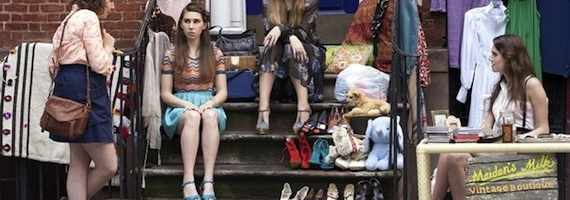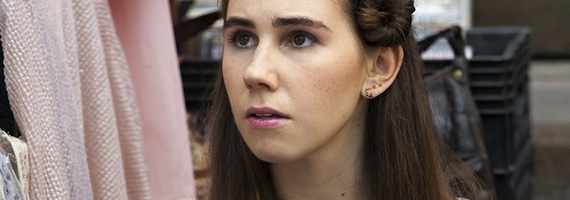Girls Season 3 Premiere Review: Truth is Overrated

I spent the day before the two-episode premiere of the third season of Girls, a show about awkward, insecure, and adventurous 20-somethings in New York, fervently searching the internet for copies. Unfortunately I had to wait until the next morning, waking up early because I was that excited. Yeah. I was very happy with the premiere–it rounded off the darkness of last season’s conclusion with a mix of optimism and, as always, dry humor. And it brought me back to one of the main analyses of the show—that it’s about people in their in-between stages. Not the making things happen or happy phases necessarily, but the hiccups that get us there, and that get pushed to the back of minds often after they pass. The early 20s, still partially supported by parents, internship instead of job, uncertain, friend and relationship breakups phase. Hannah, a budding writer who wants to “feel it all,” especially seems to be emerging from the ashes of OCD Q-tip mania and financial insecurity to producing some quality material for her book, as her harsh yet eccentric publisher told her over coffee served in chocolate cups.
Meanwhile it seems that the others seem to be entering their “lulls”. Marnie is heartbroken over Charlie, and is in a rehab facility that she hates with a passion but puts up with to get funding for her bohemian lifestyle from her grandma. At the same time, they both seem to be finding things at the bottom of that deep dark path. “Really knowing someone is something else. It’s a completely different thing. And when it happens, you won’t be able to miss it. You will be aware. And you won’t hurt, or be afraid, okay? ” Adam proclaims to a crying, food-spitting heartbroken Marnie. She smiles genuinely for the first time this season. And Jessa gets nicer at least, going down on the lovable Tastie from Orange is the New Black—who she insulted hours before, but eventually gets kicked out of rehab, leaving us wondering if she’ll be able to get by.
With Shoshanna, things aren’t so clear. She is in a golden age of sex, it seems, in stark contrast to last season’s anxiety-plagued virgin and stuck-in-a-relationship situation last season. But as so often is the case with the characters of this show, things aren’t usually as what’s projected, because these youngsters want to appear to be doing well most of the time. I don’t know why it’s so important to give off an air of thriving. Ray was fixated on being a “man” and a successful one, Marnie and Hannah hid their inner sorrows and lost-ness from each other. Others tried to fit into certain molds—Jessa got married to a wealthy anal square, Adam tried to be a proper boyfriend to a Hannah-opposite, popular girl. And as we saw, those forays into unfamiliar waters ended in bursts of glass and tears.

Speaking of Adam’s relations with Natalia, the nod to that horrible quasi-rape in the form of the altercation in front of Hannah and the Grumpy’s clientele was cringe-inducing, and it was driven home with the loud accusatory pounce of Natalia’s blonde friend Perhaps that was the point. It’s important that the show doesn’t just brush those events under the rug, though. We know that Adam has a very dark side and did something arguably unforgivable. She tries to bring it up but drops it when Adam resists. She tells him “I know you” later that day. Does Hannah know the details of what happened, and ignore them? Does she assume that the girl wasn’t down with the type of rough play they usually do? When you think about it, the situation wasn’t all that different from Adam’s first season cameos with Hannah.
He penetrated her anally without asking, didn’t clarify whether he was wearing a condom, masturbates in front of her after breaking up with her and while she’s telling him to stop, and of course there’s all the weird sex talk. The only difference might be Hannah’s curious and understanding reaction, opposed to Natalia’s somewhat-bending reluctance. Hannah still didn’t always give consent, it seems, but she seems comfortable afterwards. And in the scene with Natalia, things were also made more sinister by the dark tool-filled apartment and Adam’s off-the-wagon drunk hungry eyes. Does Hannah think it’s only a problem when he’s drinking, and does that somehow infinitesimally (and unintentionally on our parts) justify it? Does she even know he was off the wagon? Lena Dunham’s said things about anxiety-inducing sexual experiences in interviews—I wonder if these relations had that effect on Hannah.
Regardless, Adam still doesn’t fit the traditional boyfriend mold. And Hannah is definitely gracious about that. He complains quite starkly about not wanting to spend any time with her friends, but she basically says he has to, and he does quite well. After the after dinner sex, though he provided seemingly heartfelt advice to Marnie, he said he proclaimed not wanting to see them for three months. “I can’t!” he cried. Hannah laughs and answers the phone. Is Hannah just overly chill, or should girls be more tolerant of their boyfriends not wanting to hang out with their friends? I’ve always heard of this as a red-flag and non-committal symptom, but Hadam are in some post-humous extra-strong love phase not befitting of the casualness. At least based on what I’ve heard, and so I question why I’ve heard it.
Still, a big piece of the pie here is honesty, Adam’s self-proclaimed guiding principle. And this honesty was based on a bad break-up, after which he told himself he’d listen to his gut from then on. Even though now the idea seems to go counter to his love life. Or maybe it’s ultimately good in some larger way. Because what he says might just be showing that bad boyfriend side that a number of “good” boyfriends must be harboring in silence inside. Ray brought the value up in the Boys episode, telling Adam affectionately, “You know why we get along? Because we’re both honest men.” Adam flicks it away, “I think it’s cuz we’re both weird-looking,” he says without making eye contact. But in the two introductory scenes of the episode honesty was at the forefront—Hannah drags a sleepy Adam out of bed and literally onto the floor. Flash to a scene in the car, Hannah and Shoshanna singing some outdated top 40 club music while Adam has murder in his eyes. He punches the stereo repeatedly until it stops. End scene. There’s a certain rawness to it all.
Jessa ultimately breaks out of her testy shell and opens up to “fat gay Laura,” as she calls her. But her British cigarette-smoking rehab friend Jasper says truth is overrated.
“Poor thing. You’re too young to understand which thoughts are useless to you. When you’re older, your mind learns to let go of things that don’t suit you. You start to live with the same ignorance of the very young. Of course being young is terrifying as well. You have all of the knowledge, but none of the language to dissuade yourself from the horrible truths of the world.”
Where are the Girls characters on this spectrum? I’d pin them at wanting to know the truth but still chasing after it. On the tail of understanding themselves, what they want, and the people around them. Do they ignore their own inconvenient truths? This might explain why they put on the shows that they do sometimes—as a means to be farther from their, dare I say, “true” selves, and to someone they think they might be more comfortable with. Things are sort of flipped in this in-between child-adult, dependent-independent period. The trick, I think Jasper is saying, is to accept yourself and ignore everything else, stop trying so hard. That’s the only truth you have to put up with. Like Hannah said when she plopped down after hiking for about ten seconds, “It’s really liberating to say no to shit you hate. So you go ahead, you live your truth, I’ll be here, living my truth. Or we can all just go back to the car.”
Episode Gems/Random Thoughts
–“Yeah, addicts lie. Like my friend is totally addicted to Bluebery Red Bull. She’s always telling me that she hasn’t had one. But she tells me, with, like, a blue tongue.”
–Marnie’s relationship with her mom switching between overly heated to overly friendly.
–“Boredom is bullshit. Boredom is for lazy people,” Adam tells Hannah in the car as she’s eating a donut. Amen, Adam, we know you have a wild imagination anyway. But DFW says it’s the symptom of our generation. And how can you be bored when you have donuts, Hannah?
–Shoshanna half-heartedly echoing “Try to tell you no but my body but my body keeps telling you yes,” while everyone stews during the car ride back
–The premiere also seems to confront some gaps or critiques, like the lack of minority representation in the show named after a not totally white group. Laura arguably falls into certain stereotypes though, but hey, at least she’s queer. It also seems to answer some potentially-posed queries regarding Hannah’s past. The OCD thing was sort of sprung on us, as other personal/family issues have been (Jessa’s family episode, for example), but I liked the unloading in this episode. We learned about Jessa in college—dancing on the quad, abandonment issue-laden—and heard some conspicuously absent nostalgia (or even mention) of those years, when Hannah tells us it never gets better. She also says she’s been applying to grad school for years, which, and I am surprised at this since I never expected it—this whole not having a clue about what you want to do and shooting aimlessly throughout application cycles—is already and will probably continue to be the case for me and my peers too.
Rating:
What do you think? Leave a comment.











granted there are characters i can’t stand (mainly marnie and a lot of time times jess a)
but it is still an entertaining show.
it’s not HYSTERICALLY funny but it is funny. chuckle inducing. well written i believe.
i think lena dunham is very talented.
I love this show. My husband and I binge-watched it this weekend, and will continue to watch. Yes, the characters are very flawed and very annoying…yet they are also so endearing and interesting. We will continue to watch; we are hooked!
I really didn’t see much in season 2. Everybody was all over the place. I’m glad they’re past that now, or at least… I dunno, I feel like Lena has taken the reviews of season 2 into account and gone: “Right, let’s fix up what we did with season 2, and make it fun again.” While Hannah’s always had her issues, in season 1 she took them with a grain of salt and always ended the episode sort of content. In season 2 she had SERIOUS problems, like the deadline, and the tick, and not being with Adam, and there was just this emptiness in all of the characters, a bottomless pit of depression that wasn’t there in season 1. I was so pleased with those two episodes, they were like cocaine. Couldn’t stop. As the show was in season 1, so it’ll be interesting to see how this season goes. I predict good stuff!
I agree, and the writing seems better. I have already laughed out loud a couple of times, mostly on Shosh’s lines.
I also agree. These two episodes were more fun than any in season two. Lol’d many times–especially at Adam and Jessa. I really hated Jessa’s “marriage” last season.
There’s something about this show that draws me in, but for the first two season I wanted to smack each of the main characters. At least so far in the beginning of season 3, they are showing some growth.
This is the best show on television and so underrated because all people want to talk about is Lena Dunham’s body. Yes, that’s part of the show and she’s making a statement, but she’s saying so much about RIGHT NOW and I feel like most people aren’t getting it.
It’s nice to see others appreciate this show for what it is.
It is all about Dunham and her nudity. The writing is poor, the characters are awful and the situations are just dumb. I don’t know why the critics love this show. Dunham is gross.
Even if you detest the show, you probably hate it for the reasons she wants you to hate it. It’s an ironic comedy and think most people are mistaking the irony for self-absorption. It mocks its own selfish generation. Think she is younger female version of Woody Allen, and the same as Lena, you either hate him or love him. I’m not a big fan of the show but can see what she is trying to attempt.
The problem with ‘Girls’ is that it’s sort of ‘event’ television, sort of like like Mad Men. It’s got a hyper-topical premise but story-wise, they keep having to make up weirder and weirder plot conventions to keep the show moving.
Dunham created a show that has insurmountable expectations. HBO expects people to watch it because it’s somehow part of the zeitgeist, but I agree with you, it just comes off as foppish if you actually watch and don’t just keep it on in the background like most people.
As a late twenty something, once a mid-twenty something, I find Hannah’s relationships with her friends and boyfriend both familiar and enlightening. Within a single episode of girls, Hannah’s identity fluctuates between secure, insecure, dependent, and independent. This is most prevalent in her relationship with Adam. In many of their shared scenes, especially their early, awkward sexual encounters described by the Sabrina Rubakovic, Hannah displays both wisdom and desperation. Her continued relationship with Adam may be a sign of weakness or, as Rubakovic mentioned, an illustration of her mature and accepting disposition.
Girls is Sex and the City for a new generation. I’m so thrilled that it’s back on!
One of the major problems with ‘Girls’ is that its subject matter and the subject matter of many of its viewers may overlap. When something – a show, a film, a book – seems to comment on feelings or events that its viewers may have felt or experienced very acutely, there can be some quick judgments. ‘Girls’ is a study a group of people it’s not really right to “study”, for whatever reason, and for that it should be praised.
I think this show truly does hit at the heart of a lot of twenty-something’s “in-between lull,” as you put it.
It’s just a simple premise of a group of girls not really making it in New York. They aren’t failing, but they aren’t soaring, and I think that’s an avenue a lot of shows are afraid of driving down.
So much of what people want to see is the “ideal” lifestyle–of the characters getting those promotions or getting the girl in the end–but I think that what people can actually connect with is the portrayal of mediocrity. Of being average and know that’s okay.
Lena Dunham gets a lot of mixed criticism, but I think she concisely and simply gets to the point. Knowing that simple plots filled with characters that feel almost entirely believable is what will sell. It’s heartfelt, and that kind of sincerity is often hard to find mixed on television with casts of vampires or surgeons.
I completely agree however, I find it to be liberating that our generation has a completely different view on our everyday lives. Being 20 and in your 20s, absolutely sucks. What I mean by this is you can’t have both your goals and your personal life paralleling. See, I know what I want to do and I figured it out a few years ago and my goals and dreams are being achieved 1 at a time but my personal life is suffering. I feel like I am too old because I have had some amazing experiences and the people that are the same age as me, still have no clue where there lives are heading. I for one understand the Girls issues but it’s a bit to comprehend because I am just 20… I have no real experience of what they as characters are actually going through. The show definite shows bumps in the road but one must also understand that goes well beyond 20.
Girls offers a view of Generation Y that isn’t often available. This show uncovers college graduates suffering to find with in a recession crippled economy, and unrealistic goals for particularly artistic and alternative careers. The characters each represent a different stereotype of this generation, Marnie the pulled together and monotonous sorority girl, Shosh the mainstream music, technology obsessed, lady gaga glasses wearing youth of the group. Hannah obviously the most comical of them all in that she is chasing her altruistic dream of becoming a writer, while completely failing at social interactions along the way. And of course the cool kid/fuck up, Jessa. Each tail of these characters shows how the new generation will be challenged with the real world, an honesty that hasn’t been revealed for many other generations. While the show both jokes about the 1st world problems, it also unveils deep vulnerability and allows the viewer to be more comfortable with themselves because of it. Dunham has created a show that will characterize a new age.
I like authors who don’t reply comments.